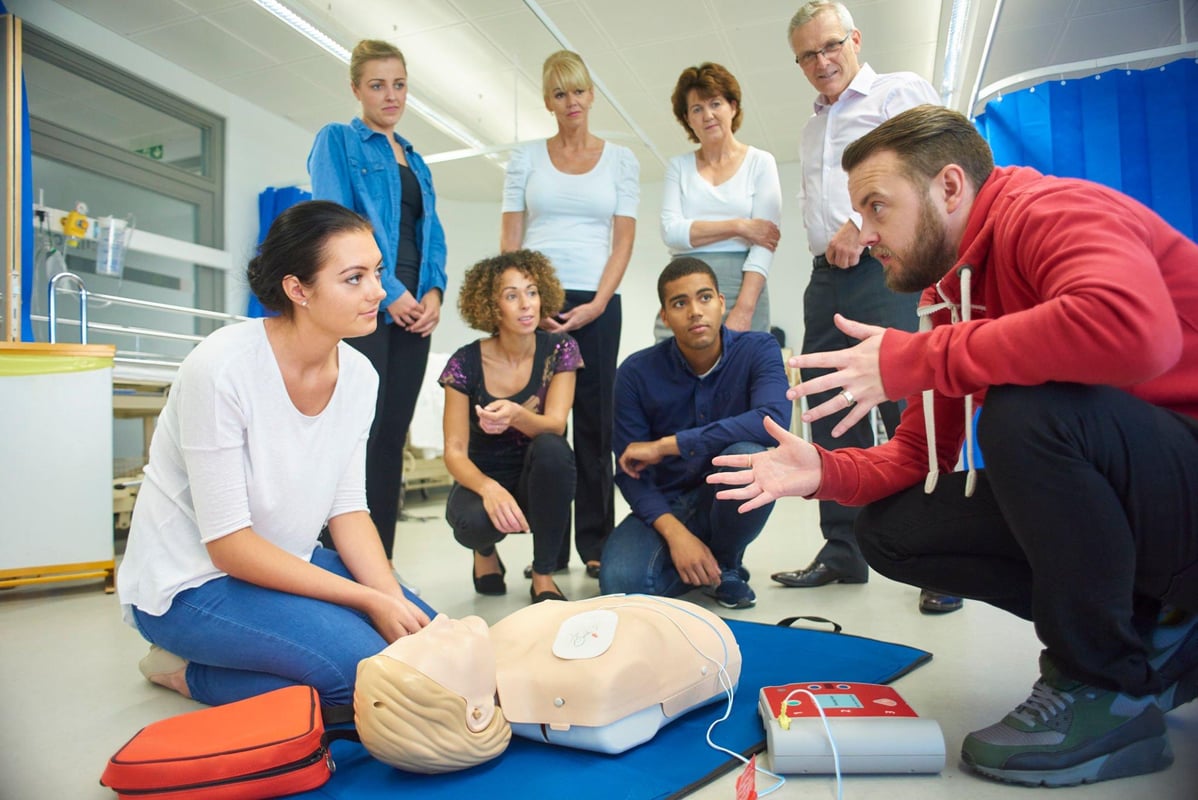
$191 to start
$2,200 total

Financial aid (may be available)

$239 to start
$4,000 total

Financial aid (may be available)
No cost info
No cost info
$1,300 total
$125 total
$85 total
No cost info
No cost info
No cost info
$36.50 total
No cost info
The city of Minneapolis is renowned for its high-quality education and vocational training programs. One such program that has gained significant attention recently is First Aid training. With a surge in demand for qualified first aiders in different fields, this post provides clear insights about First Aid training in Minneapolis. The aim is to offer a comprehensive guide to help students find the right training program.

First Aid is the immediate assistance given to anyone suffering from either a minor or serious illness or injury. The primary goal of giving first aid is to preserve life, prevent the condition from worsening, and promote recovery. It involves simple, life-saving techniques that can be performed with minimal equipment and is typically carried out until professional medical assistance arrives.
The training requirements for First Aid classes vary from one institution to another. However, there are some common aspects that every aspiring First Aid student should be aware of:
Age Requirement: Most First Aid training programs require the candidate to be at least 16 years old.
Physical Fitness: First Aid procedures often require physical exertion. Therefore, a certain level of physical fitness may be required.
CPR Certification: Some institutions might require the students to have a CPR (Cardiopulmonary Resuscitation) certification.
Searching for the right First Aid class can be overwhelming with so many options available. Here are some factors to consider when choosing a class:
Accreditation: The class should be accredited by a recognized body. Accreditation ensures that the class meets the set standards for First Aid training.
Course Content: The course should cover a wide range of topics, including CPR, use of Automated External Defibrillators (AEDs), and treating minor injuries and illnesses.
Instructors: Instructors should be experienced and certified to teach First Aid classes.
First Aid classes are usually practical in nature and involve hands-on training. There are also theoretical parts where students learn about the human body and how to handle different medical situations. Typical day-to-day activities might include:
Demonstrations: The instructor demonstrates how to perform different First Aid techniques.
Practical Sessions: Students practice these techniques under the instructor's supervision.
Assessments: Regular assessments to gauge the students' understanding and practical skills.
Upon completion of the training, students are typically required to pass a final exam to receive their First Aid certification. The exam usually includes a written part and a practical assessment. The certification is proof that the individual is trained and capable of providing First Aid assistance when required.
First Aid certification opens up a wide range of job opportunities. Various sectors like healthcare, education, and industrial settings often require employees to be First Aid certified. Job search websites, networking, and vocational training platforms like Dreambound can be effective ways to find related jobs.
Once you have your First Aid certification, you might want to consider furthering your skills with additional courses. Some related courses include:
Emergency Medical Technician (EMT) Training: This training builds on the basic First Aid skills and equips students with advanced life-saving techniques. Learn more about it here.
Certified Nursing Assistant (CNA) Training: This course trains individuals to provide basic patient care under the supervision of a registered nurse. Find out more here.
Home Health Aide Training: This program is suitable for those interested in providing in-home care for the elderly or disabled. Click here for more information.
While First Aid training is beneficial in any setting, it is especially crucial in the workplace. It ensures that employees can respond effectively in a medical emergency, preventing minor injuries from becoming major ones and saving lives.
Teaching children basic First Aid skills can be invaluable. It not only equips them with the knowledge to respond in emergencies but also instills a sense of responsibility and maturity from a young age.
Both online and in-person First Aid training have their advantages. In-person training offers hands-on practice, while online training provides flexibility and convenience. Choosing between the two depends on individual learning preferences and availability.
First Aid skills, like any other skills, can fade over time if not regularly practiced. Therefore, it's essential to keep these skills up-to-date through recertification and refresher courses.
The importance of First Aid training cannot be overstated. Whether it's in the workplace, at school, or in day-to-day life, First Aid skills can make a significant difference. With numerous First Aid classes available in Minneapolis, it's crucial to do your research and find the course that best suits your needs. Remember, your decision to get First Aid training can save lives.
If you're considering pursuing this certification in a different location, we have other in-depth guides to help. Check out our guides for different cities below:
Contemplating a change in your career path? Dreambound has written many comprehensive guides to aid you in making well-informed decisions.
Dreambound's platform allows prospective students to find the right educational program for them through searching, filtering, and connecting with our extensive selection of career & technical education partners.
Dreambound has over 70 programs across healthcare, technology, business, and industrial trades. This includes programs such as Medical Billing, Cybersecurity, and welding.
Some of our schools offer financial aid for those who qualify. Many others offer payment plans, where you can pay the cost of class over time.
Yes, Dreambound offers many online programs. On Dreambound's search, you can filter by online, in-person, and hybrid (part online, part in-person).
Dreambound is completely free for you to use! We are supported by schools and organizations who pay to advertise on our website, so we can offer all of our career resources for free.